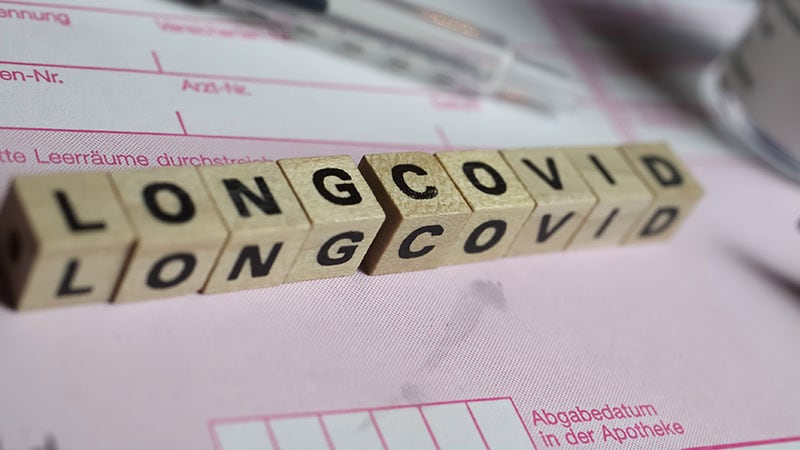[ad_1]
A group of researchers in rheumatology has raised concerns about the 2024 definition of long COVID from the National Academies of Science, Engineering, and Medicine (NASEM), citing both lack of specificity and the inclusion of autoimmune rheumatic diseases despite inconsistent evidence that they’re linked to severe acute respiratory syndrome coronavirus 2 (SARS-CoV-2) infection.
The twofold concerns were outlined in a “Notes from the Field” commentary, published on January 16, 2025, in Arthritis & Rheumatology, by Leonard H. Calabrese, DO, head of the Section of Clinical Immunology, Cleveland Clinic, Cleveland, and six other researchers in rheumatology and infectious diseases, including two affiliated with Harvard Medical School, Boston.
In June 2024, the NASEM defined long COVID as “an infection-associated chronic condition that occurs after SARS-CoV-2 infection and is present for at least 3 months as a continuous, relapsing and remitting, or progressive disease state that affects one or more organ systems.”
According to NASEM, people with long COVID may present with one or more of a long list of symptoms, such as shortness of breath, rapid heartbeat, extreme fatigue, post-exertional malaise, or sleep disturbance, or with single or multiple diagnosable conditions, including postural orthostatic tachycardia syndrome, myalgic encephalomyelitis/chronic fatigue syndrome, diabetes, or autoimmune diseases including rheumatoid arthritis, lupus, or Sjögren disease.
The definition does not require laboratory confirmation or other proof of initial infection. Long COVID can follow SARS-CoV-2 infection of any severity, including asymptomatic infections, regardless of whether they were initially recognized.
“They wanted to make the definition very broadly inclusive…This case definition tends to be highly sensitive, not leaving anyone behind. But, by definition, that results in the risk of low specificity and false positives,” Calabrese told Medscape Medical News.
Moreover, the definition doesn’t specify a timeframe between the diagnosis of COVID-19 and the subsequent diagnosis. “You don’t really have to prove that you have COVID, and then a disease arises at some timepoint. It doesn’t say 30 days or 30 months or 30 years…It arises at some point in time. This disease could be considered long COVID.”
In addition, Calabrese said, the inclusion of specific autoimmune rheumatologic diseases isn’t fully supported by data, given that autoantibodies are also seen following other infectious diseases and are often transient, and epidemiologic studies have been inconsistent in finding a link between COVID-19 and specific autoimmune rheumatologic conditions.
“Ninety-five percent of people have had COVID. If that person walks in the door with a new diagnosis, how do we apply these criteria to those patients? It’s not just rheumatology. Does every person with new-onset diabetes have long COVID because they had COVID? It will require a critical appraisal of data, and that will change over time,” Calabrese said.
NASEM Authors Respond
Asked for a response, NASEM definition co-author Betty Diamond, MD, director of the Institute of Molecular Medicine & Maureen and Ralph Nappi Professor of Autoimmune Diseases, Feinstein Institutes for Medical Research, Manhasset, New York, said that “the concern expressed in the article is valid, and not just for rheumatic disease. But I think one has to point out the concerns with too narrow a definition.”
Diamond, the only rheumatologist among the NASEM authors, added: “This broader definition may also permit clinicians and researchers to obtain information on an increasing or decreasing incidence of a disease following COVID.”
Harvey Fineberg, MD, president of the Gordon and Betty Moore Foundation and chair of the NASEM committee that wrote the report, told Medscape Medical News, “In crafting its definition, the [NASEM] committee recognized that new knowledge and clinical circumstances can and should affect the application of the definition to individual patients, and the committee called for clinicians to use clinical judgment in reaching a diagnosis. Many conditions, including rheumatologic conditions, preexisted COVID and are not uniquely attributable to prior SARS-CoV-2 infection. Making a diagnosis in a patient who has experienced COVID involves a balance between false-positive and false-negative classifications, and only through scientific advances in understanding of disease etiology can both types of error be reduced.”
‘We Do Not Have the Answers’
Calabrese and colleagues end their paper with a call for greater research and education for rheumatologists and other medical specialists. “Although we have raised important concerns, we admit that we do not have the answers to these important questions. From a clinical perspective of the rheumatology practitioner and the individual patient, the current case definition clearly provides much leeway in diagnosing long COVID based on history and clinical judgment when needed for patient care.”
The intent of their paper, Calabrese said, was “to bring attention to these criteria, since our specialty and many other specialties are not in the thick of diagnosing and managing long COVID. But with this definition, we now become a much more relevant kind of group, as others do, and if you’re not aware of what’s going on in this area, you should be.”
A NASEM spokesperson told Medscape Medical News, “The committee report recommended that the definition be reexamined and updated in light of new scientific knowledge. However, the committee, as with all National Academies committees, concluded its work with the release of its report. Work on an updated definition will depend on government and other sponsors and decisions by the National Academies or other responsible professional organizations.”
Calabrese has received consulting fees from AbbVie, Amgen, AstraZeneca, Bristol Myers Squibb, Genentech, GSK, Janssen Pharmaceuticals, UCB, Sanofi-Genzyme, Regeneron, Galvani, Mymee, PPD, Fate Therapeutics, Open Evidence, and payment or honoraria from Amgen, Janssen Pharmaceuticals, Sanofi, Regeneron, AstraZeneca, and UCB. Diamond and Fineberg had no disclosures.
Miriam E. Tucker is a freelance journalist based in the Washington, DC, area. She is a regular contributor to Medscape Medical News, with other work appearing in the Washington Post, NPR’s Shots blog, and Diatribe. She is on X @MiriamETucker.
[ad_2]
Source link : https://www.medscape.com/viewarticle/rheumatologists-concerned-broad-long-covid-definition-2025a10003ll?src=rss
Author :
Publish date : 2025-02-12 05:56:35
Copyright for syndicated content belongs to the linked Source.
